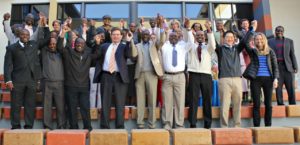The USAID-funded SIAPS program has been influential in designing Namibia’s approach to preventing the development of antimicrobial resistance including HIV drug resistance. Due to the rapid scale-up of ART services, Namibia has achieved high ART coverage of the HIV-positive population. Although it can be minimized, HIV drug resistance (HIV-DR) is anticipated to emerge among people on treatment, even when appropriate antiretroviral therapy (ART) is provided and high levels of adherence are achieved; thus, some degree of onward transmission of drug resistant virus can be anticipated.
In 2012, an assessment of transmitted drug resistance (TDR) in Namibia showed overall prevalence of TDR was estimated to be 8.54% (95% plausibility interval 2.66% to 24.2 %), while the overall prevalence of NNRTI, NRTI and PI SDRM detected in this population was estimated to be 8.54% (95% plausibility interval 2.66% to 24.2 %), 0% (95% plausibility interval 0% to 4.93%), and 0% (95% plausibility interval 0% to 4.9%), respectively. Strategic and sustained efforts at creating awareness and building coalitions against AMR & HIV-DR have been used to kick-start and institutionalize AMR containment activities in a coordinated and concerted manner. In July 2013 SIAPS supported a workshop and forum attended by multiple national stakeholders to discuss the country’s AMR strategy. More than 60 academics, administrators, and public and private sector health care workers came together to raise awareness on rational use of medicines, discuss ways of investigating medicine use, and design and review strategies for addressing medicine use problems. Together, key stakeholders devised a rational medicine use/antimicrobial resistance (RMU/AMR) call-to-action document promoting the rational use of antiretroviral agents (ARVs), anti-TB medicines, and other antimicrobials. The strategy called on stakeholders, including government, academia, regulatory authorities, professional associations, donor agencies, civil society, and media personnel, to commit an action plan to the implement of activities to enhance RMU and combat AMR in Namibia.

SIAPS is also supporting the Namibian Ministry of Health & Social Services (MoHSS) in leading the implementation of the HIV drug resistance early warning indicators (HIV-DR EWI) strategy in all the 34 districts. The use of an electronic dispensing tool (EDT) platform will assist in the routine monitoring HIV-DR EWIs, including those that provide proxy data on adherence to antiretroviral therapy. The EWI intervention has led to valuable recommendations and several achievements in Namibia, including improving the accuracy of data abstraction, engaging sites on standard dispensing practices, enhancing site collaboration in ART service delivery, boosting the use of the EDT in facilities, and adherence analysis in each facility.
To improve governance, SIAPS mobilized a multidisciplinary group of relevant stakeholders to jointly lead the fight against AMR, including the formation of Namibians Against Antimicrobial Resistance, a coalition of mostly private sector doctors to advocate for RUM/AMR in private hospitals. To strengthen human resources, SIAPS has built the institutional capacity of the University of Namibia (UNAM) to deliver training on RMU/AMR, helping to revise the UNAM curriculum to include RMU/AMR topics. UNAM is considered an important resource for conducting, analysing, disseminating, and coordinating operational research activities on RMU/AMR in Namibia. More recently, the SIAPS program collaborated with the UNAM School of Medicine and the German University of Bonn to coordinate infection control and prevention (IPC) activities, including strategies of reducing hospital acquired infections (HAI). This initiative will also include the development of a curriculum for medical students on IPC & HAI and promotion of operational research in antimicrobial resistance. SIAPS will continue to engage stakeholders in implementing and revising strategies to combat the development of AMR including HIV-DR and drug-resistant TB.

